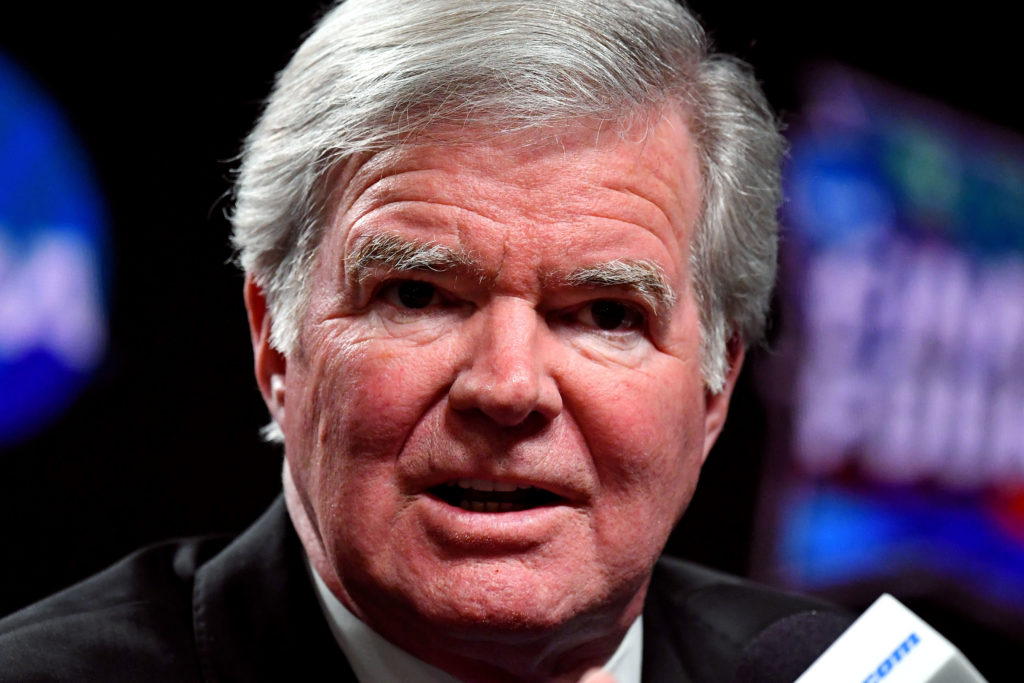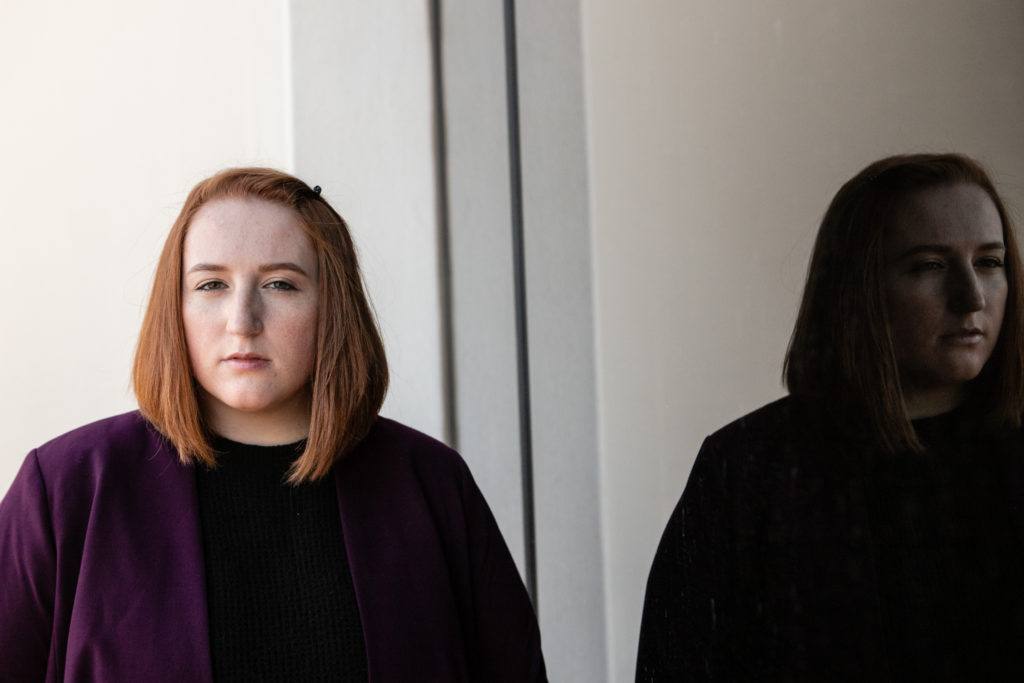NCAA president deflects blame
The finger-pointing follows a USA TODAY Network investigation about sexual assault.
NCAA President Mark Emmert on Tuesday defended his organization and deflected blame to universities just days after a USA TODAY Network investigation found that college athletes punished for sexual assault routinely transfer and keep playing in the NCAA.
His remarks came the same day that the National Organization for Women called on the NCAA to “end the predator pipeline,” evoking the title of the USA TODAY Network investigation.
Emmert, who has dodged the USA TODAY Network’s questions and interview requests for more than a month, made the comment during an Aspen Institute symposium about college-athlete pay. It was in response to an audience question about the investigation.
“When you hear, ‘The NCAA did this or did that,’ just insert, ‘the colleges and universities of America did this or did that,’” Emmert said. “That’s who makes those decisions.”

When contacted after the investigation, however, the leaders of those same institutions deflected questions back to the NCAA.
The USA TODAY Network sought interviews and comment from all 19 college and university presidents, chancellors and athletic directors who sit on the NCAA’s highest governing body, asking how they will address the problems raised in the investigation.
None would answer. Fourteen ignored the requests. Of those who responded, five tossed it back to the NCAA.
“This inquiry should be directed to the NCAA for a response,” said Texas State University President Denise Trauth, who sits on the NCAA Board of Governors.
‘Repeat offender’
The finger-pointing came amid outcry from survivor advocates and the National Organization for Women, whose president urged the NCAA to institute rigorous and enforceable codes of conduct that prevent teams from “monetizing sexual abuse.”
“The NCAA is a repeat offender when it comes to putting profits over people,” NOW President Toni Van Pelt said. “They have continued to let college athletes charged with assault off the hook.”
The USA TODAY Network investigation found at least 33 athletes since 2014 who have transferred to NCAA schools despite being administratively or criminally disciplined for sexual offenses at a previous college.
The true number may be far greater, as 5 of every 6 Division I public universities refused to release records from disciplinary proceedings that would help reveal the extent of the problem, even though federal law explicitly allows them to do so.
The NCAA, which cracks down on athletes who accept cash or a free meal, get bad grades or smoke marijuana, outlines no specific penalties for athletes who commit sexual assault. And nothing in its lengthy rulebook restricts suspended, expelled and convicted athletes from transferring to new NCAA schools and leaving past sanctions behind.
“The fact that the Board of Governors will not make a statement and has refused to make a change is complete negligence,” said Daisy Tackett, a former University of Kansas rower who, along with another rower, reported being sexually assaulted in 2015 by a Kansas football player.
The football player resurfaced on the Indiana State University team’s roster within months of Kansas finding him responsible in both rowers’ cases and banning him from its campus.
“They have an opportunity in front of them to make campuses and the NCAA a safer place,” Tackett said, “but apparently their bottom line and their public image is more important than the countless victims of abusive athletes they’ve emboldened.”

In Emmert’s comments at the Washington, D.C.-based symposium, he did not acknowledge the victims of sexual assault – many of whom, like Tackett, were NCAA athletes themselves.
Instead, Emmert said, the NCAA has spent “an enormous amount of time on the issue of the prevention of sexual assault.”
“That doesn’t mean that it’s been enough or it’s gone far enough,” he added. “If we have one of those cases, that’s very problematic.”
Potential for policy
On whether athletes convicted or disciplined for sexual assault should be able to transfer to new NCAA schools, Emmert said, “the member schools decided that those were decisions that really needed to be made at the local level by schools themselves.”
But the Board of Governors, of which Emmert is a non-voting member, in August 2018 shot down a recommendation by its own study group, the Commission to Combat Campus Sexual Violence, to direct the NCAA divisions to consider legislation for holding such athletes accountable. The board has ignored calls by eight U.S. senators to fix the problem.
At least nine current Board of Governors members, including Emmert, attended that 2018 meeting as board members at the time, minutes show.
A more recent board appointee is Renu Khator, president of the University of Houston, whose basketball team in 2015 recruited one of three players suspended for up to 10 years from the University of Oregon for sexually assaulting a female student a year earlier.
That athlete, Damyean Dotson, played two seasons under Houston head coach Kelvin Sampson after his suspension at Oregon and now plays for the NBA’s New York Knicks.
Khator did not respond to requests for comment, nor did Sampson. Houston athletics did not answer questions about Dotson, instead saying in a statement that officials “spoke with Damyean, his family and former coaches and felt confident in his ability to continue as a student-athlete” at Houston.
Houston is a member of the American Athletic Conference (AAC). But while six of the NCAA’s 33 Division I conferences already have policies and procedures aimed at preventing athletes from competing at their schools if they’ve been disciplined for sexual assault, the AAC is not one of them.
Jon Solomon, editorial director of the Sports & Society Program at the Aspen Institute, asked Emmert in a follow-up question whether the NCAA could adopt one of the conference policies nationally, such as that of the Southeastern Conference (SEC) or Big Sky Conference.
“Potentially,” Emmert said. “All the rules are different, and all of them are complicated. It is an enormously complex issue when you look at the details of it. I think it’s an issue that’s going to routinely be discussed and debated widely.”
But the time for action is now, said Blake McKay, one of two University of Oregon students who in 2016 reported being raped by a Ducks athlete, then-freshman football player Tristen Wallace.
Although the university expelled him for “unwanted penetration” twice — once for each victim — Wallace transferred to a junior college, then to Prairie View A&M University, a Division I school in Texas where he has played the last two seasons.
Board of Governors members have a duty to protect the health and safety of students on their campuses, and their lack of response to the problem and to victims like her leaves her feeling “disappointed,” McKay said.
“It is a bit alarming that someone would be able to read these facts and statistics and not want to immediately put something in place for people and other students to be protected from sexual violence on college campuses,” McKay said. “I would have appreciated the NCAA to take some action because of how much power and dictation they have over these athlete’s lives.”
Note: The eight university leaders confirmed to have participated in the August 2018 board meeting are denoted with an asterisk (*) next to their titles.
Provided comment
None
Declined to comment – Referred questions to NCAA
Michael V. Drake – President, Ohio State University
Denise Trauth – President, Texas State University*
Eli Capilouto – President, University of Kentucky*
Sandra Jordan – Chancellor, University of South Carolina, Aiken
Philip DiStefano – Chancellor, University of Colorado Boulder*
Ignored requests for comment
Randy Woodson – Chancellor, North Carolina State University
Burns Hargis – President, Oklahoma State University*
Renu Khator – President, University of Houston
Satish Tripathi – President, University at Buffalo*
M. Grace Calhoun – Athletic Director, University of Pennsylvania
David Wilson – President, Morgan State University
Ronald K. Machtley – President, Bryant University*
James J. Maher C.M. – President, Niagara University
John DeGioia – President, Georgetown University
Laura Liesman – Athletic Director, Georgian Court University
Gary Olson – President, Daemen College*
Sue Henderson – President, New Jersey City University*
Tori Murden McClure – President, Spalding University
Stevie Baker-Watson – Athletic Director, DePauw University